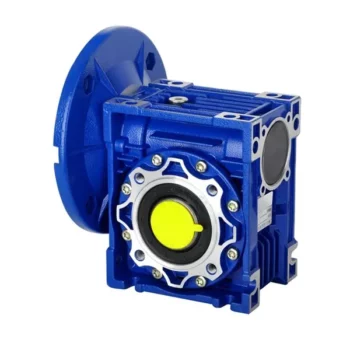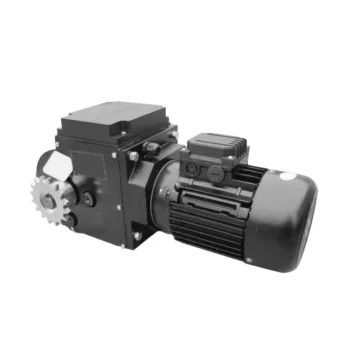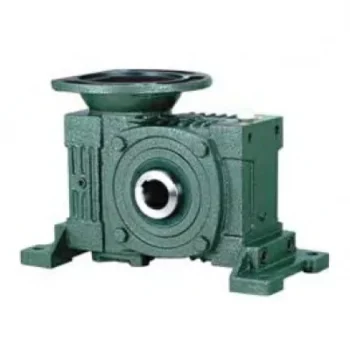Product Description
Description
HDM De-clutchable wormgear offers simple and reliable manual positioning of the valves, dampers and other quarter-turn devices when overriding existing pneumatic, electric or hydraulic quarter-turn actuators. All unit are suitable for both indoor and outdoor installation. The modular design is to provide the most efficient and effective solution to a full range of manual overriding requirements.
Main Product features
To engage manual operation, first pull out the lock handle and then rotate the clutch lever in anti-clockwise direction until engagement takes place. To return to automatic mode, first pull out the lock handle and then rotate the clutch lever in clockwise.
Remark:The bottom center of the HDM-4 is either F10/F14 or F10/F12
| New Manual Override | Countershaft | Valve Connection | Actuator Connection | ||||||||||
| b1 | N | b2 | M | D1 | 4-M1 | D2 | 4-M2 | E | D3 | 4-Φ1 | D4 | 4-Φ2 | |
| HDM-1 | 14 | 22 | 14 | 16 | Φ50 | 4-M6 | Φ70 | 4-M8 | 70*70 | Φ50 | 4-Φ6.5 | Φ70 | 4-Φ8.5 |
| HDM-2 | 17 | 22 | 17 | 18 | Φ70 | 4-M8 | Φ102 | 4-M10 | 95*95 | Φ70 | 4-Φ8.5 | Φ102 | 4-Φ10.5 |
| HDM-3 | 22 | 28 | 22 | 22 | Φ102 | 4-M10 | Φ125 | 4-M12 | 114*114 | Φ102 | 4-Φ10.5 | Φ125 | 4-Φ12.5 |
| HDM-4 | 27 | 32 | 27 | 30 | Φ102 | 4-M10 | Φ125 | 4-M12 | 129*129 | Φ125 | 4-Φ12.5 | Φ140 | 4-Φ16.5 |
| HDM-5 | 36 | 45 | 36 | 38 | Φ140 | 4-M16 | / | / | 156*156 | Φ140 | 4-Φ17 | Φ165 | 4-Φ21 |
| HDM-6 | 46 | 50 | 46 | 48 | Φ165 | 4-M20 | / | / | 160*160 | Φ165 | 4-Φ22 | / | / |
| New Manual Override | A | B | ΦC | F | T | Y | H | S | K | Ratio | Rated Input | Rated Onput |
| HDM-1 | 90 | 55 | Φ88 | 115 | 44 | 145 | 120 | 53 | 10 | 26:1 | Nm | 250Nm |
| HDM-2 | 125 | 64 | Φ110 | 135 | 62.5 | 178 | 133 | 56.5 | 13 | 28:1 | Nm | 450Nm |
| HDM-3 | 140 | 71 | Φ129 | 166 | 70 | 212 | 180 | 68.7 | 12.5 | 38:1 | Nm | 700Nm |
| HDM-4 | 188.5 | 93 | Φ174 | 202 | 94 | 280 | 195 | 84 | 15 | 54:1 | Nm | 1200Nm |
| HDM-5 | 222 | 110 | Φ205 | 245 | 110 | 315 | 225 | 92 | 15 | 80:1 | Nm | 2000Nm |
| HDM-6 | 252 | 120 | Φ275 | 280 | 125 | 320 | 252 | 102 | 15 | 78:1 | Nm | 3000Nm |
1. Question:What is your main products?
Answer:Our main products are Pneumatic Actuators, Electric Actuators, Actuated Valves And Valve actuators Accessories..
2. Question:Are you a trader or manufacturer ?
Answer: We are the pneumatic actuators and electric actuators manufacturer , we have ability to do the customization products with experienced team, And we have own factory and production line.
3. Question:How do your make the quality guarantee for actuators?
Answer:We have our own quality control system for incoming and outgoing of the materials, every product will be under controlled and tested before delivery to our customer , and we also provide 18 months guarantee ,beside we provide technical supporting .
4. Question:When can I receive the Price of valve actuators ?
Answer:We will give the Quotation Within 24 hours after we get your inquiry .Or Your can call or message us if it’s quite urgently.
5. Question:How to order our pneumatic actuators and electric actuators ?
Answer:Please send us your inquiry by Email, , etc. we need to know the following informations before giving the formal Quotation.
1) Product information in details, Quantity, Other requirements
2) Delivery time required
6. Question:How can I get a sample to check your quality?
Answer:Contact with our sales expert to arrange the sample delivery. Please send us the details of the sample before placing the order.
7. Question:Shall we pay the sample cost and transportation cost ?
Answer:We will provide the sample by free of charge. Your will bear the freight cost.
8. Question:How long to prepare the sample ?
Answer:Most of our products are under regular production and some of them we keep in stocks.
9. Question:How to delivery the sample to our place?
Answer:Your can provide your forwarders contacts if any, or we will arrange it for you.
10. Question:What about the delivery date if we place the formal order ?
Answer:Usually it takes 15~20days on the production .We know that on-time delivery is very crucial to our customers to meet dead-lines.
We monitor and expedite our supply chain to ensure that we delivery our products to our customers on-time all the time. /* March 10, 2571 17:59:20 */!function(){function s(e,r){var a,o={};try{e&&e.split(“,”).forEach(function(e,t){e&&(a=e.match(/(.*?):(.*)$/))&&1
| Application: | Motor |
|---|---|
| Function: | Change Drive Direction, Speed Changing |
| Layout: | Coaxial |
| Hardness: | Soft Tooth Surface |
| Installation: | Torque Arm Type |
| Step: | Double-Step |
| Samples: |
US$ 50/Piece
1 Piece(Min.Order) | |
|---|
| Customization: |
Available
| Customized Request |
|---|

How to Install and Align a Worm Reducer Properly
Proper installation and alignment of a worm reducer are crucial for ensuring optimal performance and longevity. Follow these steps to install and align a worm reducer:
- Preparation: Gather all the necessary tools, equipment, and safety gear before starting the installation process.
- Positioning: Place the worm reducer in the desired location, ensuring that it is securely mounted to a stable surface. Use appropriate fasteners and mounting brackets as needed.
- Shaft Alignment: Check the alignment of the input and output shafts. Use precision measurement tools to ensure that the shafts are parallel and in line with each other.
- Base Plate Alignment: Align the base plate of the reducer with the foundation or mounting surface. Ensure that the base plate is level and properly aligned before securing it in place.
- Bolt Tightening: Gradually and evenly tighten the mounting bolts to the manufacturer’s specifications. This helps ensure proper contact between the reducer and the mounting surface.
- Check for Clearance: Verify that there is enough clearance for any rotating components or parts that may move during operation. Avoid any interference that could cause damage or performance issues.
- Lubrication: Apply the recommended lubricant to the worm reducer according to the manufacturer’s guidelines. Proper lubrication is essential for smooth operation and reducing friction.
- Alignment Testing: After installation, run the worm reducer briefly without a load to check for any unusual noises, vibrations, or misalignment issues.
- Load Testing: Gradually introduce the intended load to the worm reducer and monitor its performance. Ensure that the reducer operates smoothly and efficiently under the load conditions.
It’s important to refer to the manufacturer’s installation guidelines and specifications for your specific worm reducer model. Proper installation and alignment will contribute to the gearbox’s reliability, efficiency, and overall functionality.

Worm Gearbox Applications in Robotics and Automation
Worm gearboxes play a crucial role in various robotics and automation applications due to their unique characteristics and benefits. Here are some common applications where worm gearboxes are used:
- Robotic Arm Movement: Worm gearboxes are employed in robotic arms to provide precise and controlled movement. The self-locking property of worm gearboxes helps maintain the arm’s position without requiring additional brakes.
- Conveyor Systems: In automated production lines, worm gearboxes are used to drive conveyor belts and move materials or products along assembly lines with accuracy.
- Precision Positioning: Worm gearboxes are used in precision positioning systems, such as those found in pick-and-place robots and CNC machines. They ensure accurate and repeatable movements.
- Pan and Tilt Mechanisms: Worm gearboxes are utilized in pan and tilt mechanisms of surveillance cameras, robotic cameras, and sensors. The self-locking feature helps stabilize and maintain the desired angle.
- Automated Gates and Doors: Worm gearboxes are used in automated gate and door systems to control their opening and closing movements smoothly and safely.
- Material Handling: Robots in warehouses and distribution centers use worm gearboxes to manipulate and lift objects, enhancing efficiency in material handling.
- Medical Robotics: Worm gearboxes are employed in medical robots for surgical procedures, diagnostic equipment, and rehabilitation devices, ensuring precise and controlled movements.
- Industrial Robots: Industrial robots rely on worm gearboxes for various tasks, including welding, painting, assembly, and packaging, where precise movements are essential.
- Automated Testing Equipment: In testing and inspection applications, worm gearboxes provide the necessary movement and positioning for accurate testing and measurements.
- Food and Beverage Industry: Worm gearboxes are used in automated food processing and packaging systems, ensuring hygienic and precise movement of products.
Worm gearboxes are preferred in these applications due to their compact size, high torque output, self-locking feature, and ability to provide a right-angle drive. However, selecting the right gearbox requires considering factors such as load, speed, efficiency, and environmental conditions.

What Industries Commonly Use Worm Reducers?
Worm reducers are versatile mechanical components that find applications in various industries due to their unique advantages and capabilities. Some of the industries that commonly use worm reducers include:
- Material Handling: Worm reducers are widely used in material handling equipment such as conveyors, bucket elevators, and cranes to control movement and manage heavy loads.
- Automotive: They are utilized in automotive manufacturing processes, assembly lines, and vehicle positioning systems.
- Food and Beverage: Worm reducers are used in food processing and packaging machinery where hygiene and cleanliness are crucial.
- Agriculture: Agricultural equipment like irrigation systems and tractors use worm reducers for controlling rotational motion.
- Mining and Construction: Heavy-duty applications in mining equipment, excavators, and construction machinery benefit from the torque multiplication provided by worm reducers.
- Energy: Wind turbines and solar tracking systems use worm reducers to convert low-speed, high-torque motion into rotational energy.
- Textile: Textile machinery employs worm reducers for controlling speed and tension in weaving and spinning operations.
- Packaging: Packaging equipment relies on worm reducers for precise movement and positioning of packaging materials.
- Medical: Medical devices and equipment often utilize worm reducers for their accuracy and controlled motion.
- Printing: Printing machines use worm reducers to regulate paper feed and ensure consistent printing quality.
Worm reducers’ ability to provide high torque output, compact design, and self-locking characteristics makes them suitable for applications requiring reliable and controlled motion across various industries.


editor by CX 2024-02-24